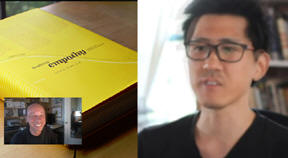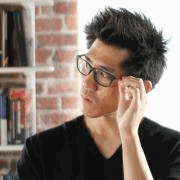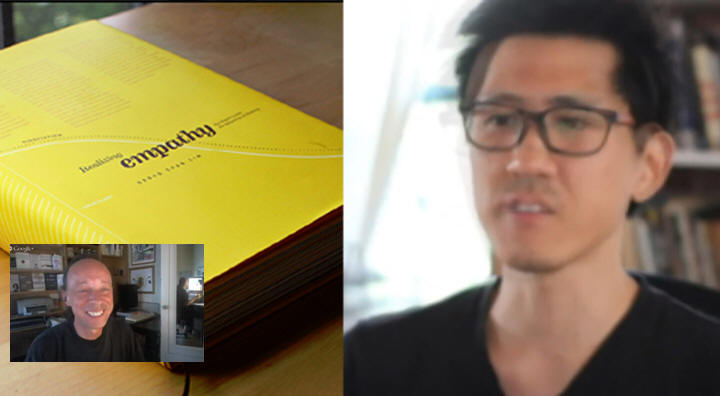|
|
|
Culture of Empathy Builder:
Seung Chan (Slm) Lim
Realizing Empathy:
Seung Chan Lim (Slim)
and Edwin Rutsch
Seung Chan Lim, better known as
Slim, is the director for project Realizing Empathy. Realizing Empathy is
a project that asks what it means to make something, how it works as a
process, and why it matters to our lives. It explores these questions
across disciplines such as fine arts, performing arts, design, science,
and engineering.
What is Empathy?
by Seung Chan Lim
A thoughtful examination of empathy in life and in the context of design
reveals that empathy is not merely about receiving, but also about
giving.
"It’s generally a good idea to be weary of
buzzwords. Empathy is no exception.
My first encounter with the word was more than 10 years ago. I was a few
years out of college and a close friend was suffering from bipolar
depression. Out of a sincere desire to help, I sought out a
psychiatrist.
At our first meeting, the psychiatrist recommended I empathize with my
friend. I asked her how, and she requested that I first learn to listen.
“Listen?” I asked myself. “I surely know how to do that already!” I
thought to myself."
Lynn
Johnson This panel of guest artists
from the fields of dance, music, theater, and design, shared their
personal insights of how empathy plays a vital part in their
various art forms. The artists also outlined how they would make
empathy front and center in our culture through their art form.
Fostering Empathy
With the Arts
Post-Workshop Panel on "Making as Empathic Conversation""
Seung Chan
Lim (Slim) Empathizing with Paul Bloom's Case Against Empathy.
Q&A: Seung Chan Lim on improving human centered design |
SmartPlanet
A Talk on How
Realizing Empathy Can Guide the Learning and the Creative Process
"A talk given at University of Toronto Rotman School of Management on
how realizing empathy can guide the learning and the creative process." he has Intense
desire to judge (demean) new things - learned how wrong he was put down
design put down art learned more
how empathy is at the core of creativity is realizing empathy 3 topics empathy
itself relationship
of empathy and learning (usually used for morality) relationship
of empathy and creativity Bipolar
depression friend story good problem
solver but bad at empathy you don't
understand framed as
her fault - she is the problem, I'm problem solver. Started
reflecting back to her she thanked
me What is
empathy? with story
started with sympathy moved to
empathy. started embodying and embodying my friend how it is
that we go from not empathy (A) to empathy (B) realizing
empathy is the process of going from point A to B Empathy and
Learning with no
effort - ie movie, with effort
- conflict -
awareness, care, ability learn a
new choice see what
is in front of you 3 stages or
realizing empathy
association - if new problem want to solve it or judge
it
conversation - instead have conversation about paradoxes
biassociation - a fusion - core of creativity innovation -
is new and meaningful to the context it is introduced to can't
innovate until you realize empathy innovate
causes: surprises and gratitude Empathy and
the creative process conversation
- empathic makes it smoother Respecting
(knowing there are different perspectives) Listening shared
meaning brain
associations - making new associations - making new meaning
Considering - (experiencing the other) Acting -
sincerely honest - the experience is all yours. Shared common
humanity( Imagine-self) resilient
curiosity - need it to realize empathy. Empathy is
reciprocal - (not selfish or altruistic) is a most beautiful loop Q and A
Realizing
Empathy: The Empathy Workshop - October 2013
Realizing
Empathy on Creativity, Innovation, and Transformation
Realizing Empathy
on What Art School Really Teaches You.
Realizing Empathy: An Inquiry into the Meaning of Making
Edwin Rutsch - Seung Chan Lim brainstorm about Empathy Conference Panels
Edwin Rutsch and Seung Chan Lim (Slim) talk about Empathy Conference
How Making Helps Us Learn to Realize Empathy
|
|||||||||||||||||||||||||||||||||
|
||||









